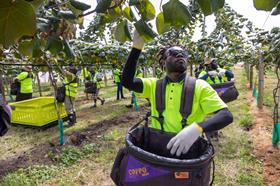
A combination of “good practice and good fortune” helped the New Zealand kiwifruit industry navigate labour and weather challenges over 2021 harvest, according New Zealand Kiwifruit Growers (NZKGI).
With the last fruit of the season picked and packed, NZKGI has reported a “record crop” is now headed for overseas markets – if not there already.
NZKGI chief executive Colin Bond said domestic operational practices weren’t disrupted by Covid-19 to the same extent as 2020.
However, continued border closures meant Working Holiday Visa (WHV) numbers were down significantly and RSE (Recognised Seasonal Employer) spots were limited. It meant there was a heavy reliance on New Zealand workers filling orchard and packhouse roles.
“We continued our labour attraction strategies from previous years, based on getting good information on the work available to potential workers via collateral and a range of media, including a strong social media programme,” Bond explained.
“That was bolstered this year by the support from the Ministry of Social Development and Ministry for Primary Industries, which made significant contributions to get unemployed Kiwis into the kiwifruit industry.”
Bond said NZKGI would closely review and evaluate its 2021 recruitment programme and assess how labour challenges could be reduced in 2022.
“We see kiwifruit, along with the other horticultural crops, needing certainty of labour supply and one way we can encourage this is by supporting employment of a workforce that can be on the orchards almost year-round,” Bond added.
Increased numbers of RSE workers from the Pacific Island nations will be essential over coming seasons, according to Bond.
“That would be a massive boon for both the Island economies, which are struggling given the massive impact of COVID-19 on tourism, and the New Zealand primary sector,” he said. “In the longer-term, the industry is also looking at automation and is innovating and expanding into this area.”
Bond said a pattern of mixed weather through the season slowed the harvest, meaning production work was often disrupted.
“It was a very wet season and a long one,” Bond explained. “That simply means the fruit is on the vines longer and increases the pressure to get it picked at the optimum time.”



